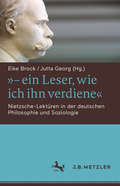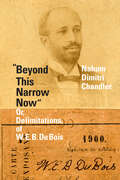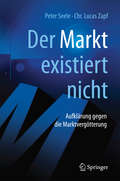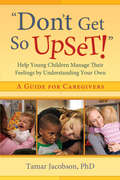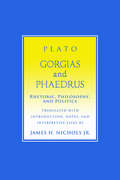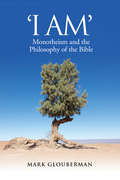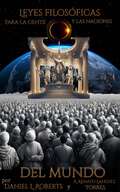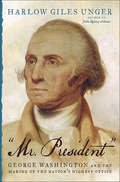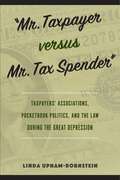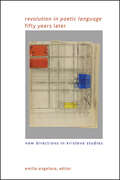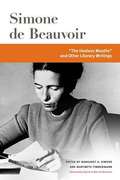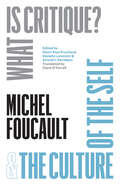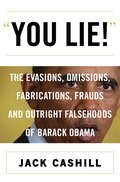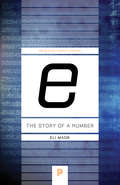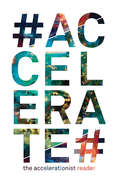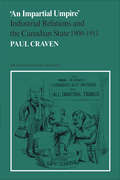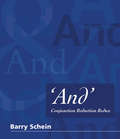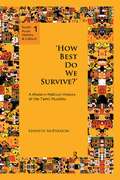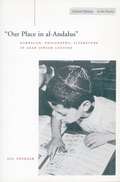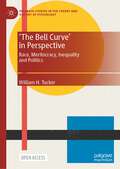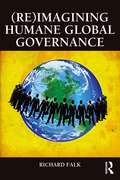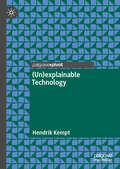- Table View
- List View
"- ein Leser, wie ich ihn verdiene": Nietzsche-Lektüren in der deutschen Philosophie und Soziologie
by Jutta Georg Eike BrockDieses Buch trägt die Nietzsche-Rezeption im deutschsprachigen Raum anhand der bedeutendsten Autorinnen und Autoren zusammen, wobei neben der philosophischen auch die soziologische Rezeption berücksichtigt wird. Es dokumentiert die spannenden Veränderungen des Nietzsche-Verständnisses im Wandel der Zeiten und eröffnet im selben Atemzug neue Perspektiven für die Interpretation von Nietzsches Philosophie. Nicht zuletzt ist der Band eine exklusive Informationsquelle und Orientierungshilfe für Nietzsche-Forscherinnen und -Forscher und – ganz nebenbei – eine etwas andere Geschichte der deutschen Philosophie des 20. Jahrhunderts.
"Beyond This Narrow Now": Or, Delimitations, of W. E. B. Du Bois
by Nahum Dimitri ChandlerIn “Beyond This Narrow Now” Nahum Dimitri Chandler shows that the premises of W. E. B. Du Bois's thinking at the turn of the twentieth century stand as fundamental references for the whole itinerary of his thought. Opening with a distinct approach to the legacy of Du Bois, Chandler proceeds through a series of close readings of Du Bois's early essays, previously unpublished or seldom studied, with discrete annotations of The Souls of Black Folk: Essays and Sketches of 1903, elucidating and elaborating basic epistemological terms of his thought. With theoretical attention to how the African American stands as an example of possibility for Du Bois and renders problematic traditional ontological thought, Chandler also proposes that Du Bois's most well-known phrase—“the problem of the color line”—sustains more conceptual depth than has yet been understood, with pertinence for our accounts of modern systems of enslavement and imperial colonialism and the incipient moments of modern capitalization. Chandler's work exemplifies a more profound engagement with Du Bois, demonstrating that he must be re-read, appreciated, and studied anew as a philosophical writer and thinker contemporary to our time.
"Der Markt" existiert nicht
by Peter Seele Chr. Lucas Zapf Jochen Hörisch Christoph Weber-BergDer Markt diktiert unsere Wirtschaft: Er zwingt Unternehmen zu Entlassungen, scheucht die Politik vor sich her oder reagiert nervös. Doch existiert dieser „Markt“ überhaupt? Und was verbirgt sich dahinter? Peter Seele und Lucas Zapf räumen auf mit dieser Vergötterung eines bewährten Tauschmechanismus zwischen Individuen, Unternehmen und öffentlichen Akteuren. In diesem Buch betrachten sie den Marktbegriff unter logischen Aspekten und untersuchen seine Bedeutung und Verwendung in der Sprache. Mit diesem logischen Blickwinkel fällen sie keine Aussage über ein wahrhaftiges Dasein des Marktes – vielmehr weisen sie darauf hin, wie die Marktvergötterung genutzt wird, um beispielsweise unangenehme Entscheidungen zu legitimieren und die Verantwortung auf einen ominösen Markt abzuwälzen. Sie entwerfen einen freien und aufgeklärten Marktbegriff, der diese riskanten Verzerrungen verhindert.
"Don't Get So Upset!"
by Tamar JacobsonAll childcare professionals were children once, and how their parents responded to their emotional expressions affects how they respond to emotional expressions by children in their own care."Don't Get So Upset!" examines the uncomfortable emotions providers feel--and the inappropriate ways they may respond--when children exhibit strong feelings, especially anger, fear, and grief. The book challenges teachers to reflect on their own emotional histories and to find strategies for responding to children in ways that support children's emotional health and development. It also examines how gender, culture, and societal roles can impact providers' responses to children's emotional expressions.
"Gorgias" and "Phaedrus": Rhetoric, Philosophy, and Politics
by Plato James H. Nichols Jr.With a masterful sense of the place of rhetoric in both thought and practice and an ear attuned to the clarity, natural simplicity, and charm of Plato's Greek prose, James H. Nichols Jr., offers precise yet unusually readable translations of two great Platonic dialogues on rhetoric.The Gorgias presents an intransigent argument that justice is superior to injustice: To the extent that suffering an injustice is preferable to committing an unjust act. The dialogue contains some of Plato's most significant and famous discussions of major political themes, and focuses dramatically and with unrivaled intensity on Socrates as a political thinker and actor. Featuring some of Plato's most soaringly lyrical passages, the Phaedrus investigates the soul's erotic longing and its relationship to the whole cosmos, as well as inquiring into the nature of rhetoric and the problem of writing.Nichols's attention to dramatic detail brings the dialogues to life. Plato's striking variety in conversational address (names and various terms of relative warmth and coolness) is carefully reproduced, as is alteration in tone and implication even in the short responses. The translations render references to the gods accurately and non-monotheistically for the first time, and include a fascinating variety of oaths and invocations. A general introduction on rhetoric from the Greeks to the present shows the problematic relation of rhetoric to philosophy and politics, states the themes that unite the two dialogues, and outlines interpretive suggestions that are then developed more fully for each dialogue.The twin dialogues reveal both the private and the political rhetoric emphatic in Plato's philosophy, yet often ignored in commentaries on it. Nichols believes that Plato's thought on rhetoric has been largely misunderstood, and he uses his translations as an opportunity to reconstruct the classical position on right relations between thought and public activity.
"I AM": Monotheism and the Philosophy of the Bible
by Mark GloubermanFor whom was the Hebrew Bible written? How much truth does it contain? What, according to the Bible, is the place of men and women in the world? What connection is there between the Bible and morality? In "I AM" Mark Glouberman supplies new answers to these old questions. He does this by establishing that the foundational scripture of the West is, first and foremost, a philosophical document, not a theological tract, nor yet the religious history of a nation. The author identifies the Bible’s fundamental principle, the ontological principle of particularity. This principle, he shows, is what makes the Bible the revolutionary text that it is. God’s "I AM WHO I AM" asserts the principle, of which the Bible’s deity is a personified form. God’s self-identification also points to the real, anthropological, meaning of the ism called "monotheism." A portion of Glouberman’s book is devoted to illustrating the Bible’s live relevance in many of the areas where modern philosophers congregate, including moral philosophy, political philosophy, metaphysics, and epistemology. Isn’t it a bit late in the day for the Bible’s meaning to be revealed? Glouberman says that it’s about time.
"I'm Not a Racist, But . . .": The Moral Quandary of Race
by Lawrence BlumNot all racial incidents are racist incidents, Lawrence Blum says. "We need a more varied and nuanced moral vocabulary for talking about the arena of race. We should not be faced with a choice of 'racism' or nothing." Use of the word "racism" is pervasive: An article about the NAACP's criticism of television networks for casting too few "minority" actors in lead roles asks, "Is television a racist institution?" A white girl in Virginia says it is racist for her African-American teacher to wear African attire. Blum argues that a growing tendency to castigate as "racism" everything that goes wrong in the racial domain reduces the term's power to evoke moral outrage. In "I'm Not a Racist, But . . .", Blum develops a historically grounded account of racism as the deeply morally-charged notion it has become. He addresses the question whether people of color can be racist, defines types of racism, and identifies debased and inappropriate usages of the term. Though racial insensitivity, racial anxiety, racial ignorance and racial injustice are, in his view, not "racism," they are racial ills that should elicit moral concern. Blum argues that "race" itself, even when not serving distinct racial malfeasance, is a morally destructive idea, implying moral distance and unequal worth. History and genetic science reveal both the avoidability and the falsity of the idea of race. Blum argues that we can give up the idea of race, but must recognize that racial groups' historical and social experience has been shaped by having been treated as if they were races.
"Leyes filosóficas para la gente y las naciones del mundo.": "Explorando el Impacto de la Filosofía en la Legislación Global"
by Daniel L. Roberts1. Propuesta de Ley de Conservación: Se propone una ley que destine estímulos económicos del gobierno federal para invertir en proyectos de conservación, como la siembra de nubes y la reforestación, con el fin de combatir el calentamiento global y restaurar el suministro de agua. 2. Análisis sobre la Siembra de Nubes:Se discute cómo la modificación de los patrones climáticos afecta la formación de tormentas y se propone el uso de la siembra de nubes para restaurar los ciclos pluviales y combatir la sequía. 3. Propuesta de Ley de Solución Momentánea: Se presenta una ley que busca utilizar fondos federales para incentivar la adopción y reducir la tasa de natalidad, así como promover prácticas de construcción sostenible y reforestación para combatir el cambio climático. 4. Propuesta de Ley de Libertad de Aprendizaje:Se propone una legislación que brinde a los estudiantes la opción de asistir a la escuela solo dos días a la semana y dedicar el resto del tiempo a la educación en el hogar o el aprendizaje en línea, con el objetivo de proporcionar un entorno educativo más flexible y adaptado a las necesidades individuales de los estudiantes. En general, los textos abordan una variedad de temas, desde la conservación ambiental hasta la educación y la filosofía, con el objetivo común de proponer soluciones innovadoras para los desafíos actuales que enfrenta la sociedad.
"Mr. President": George Washington and the Making of the Nation's Highest Office
by Harlow Giles UngerAlthough the framers gave the president little authority, George Washington knew whatever he did would set precedents for generations of future leaders. To ensure their ability to defend the nation, he simply ignored the Constitution when he thought it necessary. In a revealing new look at the birth of American government, #147;Mr. President” describes Washington’s presidency in a time of continual crisis, as rebellion and attacks by foreign enemies threatened to destroy this new nation. Constantly weighing preservation of the Union against preservation of individual liberties and states’ rights, Washington assumed more power with each crisis. In a series of brilliant but unconstitutional maneuvers he forced Congress to cede control of the four pillars of executive power: war, finance, foreign affairs, and law enforcement. Drawing on rare documents and letters, Unger shows how Washington combined political cunning and sheer genius to seize ever-widening powers, impose law and order while ensuring individual freedom, and shape the office of President of the United States.
"Mr. Taxpayer versus Mr. Tax Spender": Taxpayers' Associations, Pocketbook Politics, and the Law during the Great Depression
by Linda Upham-BornsteinDuring the Great Depression, the proliferation of local taxpayers’ associations was dramatic and unprecedented. The justly concerned members of these organizations examined the operations of state, city, and county governments, then pressed local officials for operational and fiscal reforms. These associations aimed to reduce the cost of state and local governments to make operations more efficient and less expensive. “Mr. Taxpayer versus Mr. Tax Spender” presents a comprehensive overview of these grassroots taxpayers’ leagues beginning in the 1860s and shows how they evolved during their heyday in the 1930s. Linda Upham-Bornstein chronicles the ways these taxpayers associations organized as well as the tools they used—constructive economy, political efforts, tax strikes, and tax revolt through litigation—to achieve their objectives. Taxpayer activity was a direct consequence of—and a response to—the economic crisis of the Great Depression and the expansion of the size and scope of government. “Mr. Taxpayer versus Mr. Tax Spender” connects collective tax resistance in the 1930s to the populist tradition in American politics and to other broad impulses in American political and legal history.
"Revolution in Poetic Language" Fifty Years Later: New Directions in Kristeva Studies (SUNY series in Gender Theory)
by Emilia AngelovaIn her 1974 Revolution in Poetic Language, Julia Kristeva resisted the abstract use of language, with its aim of totalization and finality, in all its colonizing and alienating forms. A major thinker and critic, Kristeva reappropriated Hegel's concepts of desire and negativity, in conjunction with the thought of Heidegger, Arendt, Freud, and Lacan, to revolt against modernity's culture of nihilism and the West's inability to deal with loss. This collection celebrates the fiftieth anniversary of Revolution in Poetic Language by revisiting Kristeva's oeuvre and establishing exciting new directions in Kristeva studies. Engaging with queer and transgender studies, disability studies, decolonial studies, and more, renowned and rising scholars plot continuities in—and push the boundaries of—Kristeva's thinking about loss, revolution, and revolt. The volume also includes two essays by Kristeva, translated into English for the first time here—"The Impossibility of Loss" (1988) and "Of What Use Are Poets in Times of Distress?" (2016).
"The Useless Mouths" and Other Literary Writings
by Simone De Beauvoir Sylvie Le Beauvoir Margaret A. Simons Marybeth Timmermann"The Useless Mouths" and Other Literary Writings brings to English-language readers literary writings--several previously unknown--by Simone de Beauvoir. Culled from sources including various American university collections, the works span decades of Beauvoir's career. Ranging from dramatic works and literary theory to radio broadcasts, they collectively reveal fresh insights into Beauvoir's writing process, personal life, and the honing of her philosophy. The volume begins with a new translation of the 1945 play "The Useless Mouths," written in Paris during the Nazi occupation. Other pieces were discovered after Beauvoir's death in 1986, such as the 1965 short novel Misunderstanding in Moscow, involving an elderly French couple who confront their fears of aging. Two additional previously unknown texts include the fragmentary "Notes for a Novel," which contains the seed of what she later would call "the problem of the Other," and a lecture on postwar French theater titled "Existential Theater." The collection notably includes the eagerly awaited translation of Beauvoir's contribution to a 1965 debate among Jean-Paul Sartre and other French writers and intellectuals, "What Can Literature Do?" Prefaces to well-known works such as Bluebeard and Other Fairy Tales,La Bâtarde, and James Joyce in Paris: His Final Years are also available in English for the first time, alongside essays and other short articles. A landmark contribution to Beauvoir studies and French literary studies, the volume includes informative and engaging introductory essays by prominent and rising scholars. Contributors are Meryl Altman, Elizabeth Fallaize, Alison S. Fell, Sarah Gendron, Dennis A. Gilbert, Laura Hengehold, Eleanore Holveck, Terry Keefe, J. Debbie Mann, Frederick M. Morrison, Catherine Naji, Justine Sarrot, Liz Stanley, Ursula Tidd, and Veronique Zaytzeff.
"What Is Critique?" and "The Culture of the Self" (The Chicago Foucault Project)
by Michel FoucaultNewly published lectures by Foucault on critique, Enlightenment, and the care of the self. On May 27, 1978, Michel Foucault gave a lecture to the French Society of Philosophy where he redefined his entire philosophical project in light of Immanuel Kant’s 1784 text “What Is Enlightenment?” Foucault strikingly characterizes critique as the political and moral attitude consisting in the “art of not being governed like this,” one that performs the function of destabilizing power relations and creating the space for a new formation of the self within the “politics of truth.” This volume presents the first critical edition of this crucial lecture alongside a previously unpublished lecture about the culture of the self and three public debates with Foucault at the University of California, Berkeley, in April 1983. There, for the first time, Foucault establishes a direct connection between his reflections on the Enlightenment and his analyses of Greco-Roman antiquity. However, far from suggesting a return to the ancient culture of the self, Foucault invites his audience to build a “new ethics” that bypasses the traditional references to religion, law, and science.
"You Lie!": The Evasions, Omissions, Fabrications, Frauds and Outright Falsehoods of Barack Obama
by Jack CashillA devastating catalog of Barack Obama’s numerous evasions, misleading statements and blatant lies, from statements in his national bestseller Dreams from My Father to “You can keep your health plan,” PolitiFact’s 2013 “Lie of the Year.”During President Obama’s address to Congress in November 2009, Representative Joe Wilson of South Carolina shouted, “You lie!” As Jack Cashill details, the president has been lying about his personal history and his political philosophy from the beginning of his political career. Yet throughout his meteoric rise and the first five years of his presidency, the liberal media turned a blind eye to his numerous evasions, contradictions, misstatements, deceptions, untruths, and outright falsehoods.It wasn’t until the disastrous Obamacare rollout that the president’s lies caught up with him. Finally, it was impossible even for the mainstream media to ignore the president’s repeated assertions that all Americans could keep their health care plans and family doctors if they so chose. In You Lie! conservative journalist and author Jack Cashill provides a devastating compendium of the president’s false and misleading statements on matters great and small, from the deliberate distortions in his celebrated memoir, Dreams from My Father, to his rise to the White House and his years as president.
"e": The Story of a Number
by Eli MaorThe interest earned on a bank account, the arrangement of seeds in a sunflower, and the shape of the Gateway Arch in St. Louis are all intimately connected with the mysterious number e. In this informal and engaging history, Eli Maor portrays the curious characters and the elegant mathematics that lie behind the number. Designed for a reader with only a modest mathematical background, this biography brings out the central importance of e to mathematics and illuminates a golden era in the age of science.
#Accelerate: The Accelerationist Reader
by Robin Mackay Armen AvanessianAn apparently contradictory yet radically urgent collection of texts tracing the genealogy of a controversial current in contemporary philosophy.Accelerationism is the name of a contemporary political heresy: the insistence that the only radical political response to capitalism is not to protest, disrupt, critique, or détourne it, but to accelerate and exacerbate its uprooting, alienating, decoding, abstractive tendencies.#Accelerate presents a genealogy of accelerationism, tracking the impulse through 90s UK darkside cyberculture and the theory-fictions of Nick Land, Sadie Plant, Iain Grant, and CCRU, across the cultural underground of the 80s (rave, acid house, SF cinema) and back to its sources in delirious post-68 ferment, in texts whose searing nihilistic jouissance would later be disavowed by their authors and the marxist and academic establishment alike.On either side of this central sequence, the book includes texts by Marx that call attention to his own “Prometheanism,” and key works from recent years document the recent extraordinary emergence of new accelerationisms steeled against the onslaughts of neoliberal capitalist realism, and retooled for the twenty-first century.At the forefront of the energetic contemporary debate around this disputed, problematic term, #Accelerate activates a historical conversation about futurality, technology, politics, enjoyment, and capital. This is a legacy shot through with contradictions, yet urgently galvanized today by the poverty of “reasonable” contemporary political alternatives.
'An Impartial Umpire': Industrial Relations and the Canadian State 1900-1911
by Paul CravenThis book is an insightful and detailed analysis of Canadian labour relations policy at the beginning of the 20th century, and of the formulation of distinctive features which still characterize it today. The development and reception of this policy are explained as a product of ideological and economic forces. These include the impact of international unionism on the Canadian working class, the emergence of scientific management in business ideology, and the special role of the state in economic development and the mediation of class relationships.The ideas and career of Mackenzie King, including his 'new liberalism,' and his activities in regard to the Department of Labour are examined, revealing how he moulded Canada's official position in the relations between capital and labour. With a focus on King's intellectual qualities in an international context, the author brings out another dimension, portraying him as Canada's first practising social scientist.The book examines implementation of policy through an analysis of the work of the Department of Labour through detailed case studies of government interventions in industrial disputes. The initial acceptance of the labour relations policy by the labour movement is explained and its repudiation in 1911 is examined against a background of setbacks which reflected its practical limits as much as its philosophical orientation. The result is a study which moves beyond a particular concern with labour policy to illuminate the contours of Canadian life in a crucial period of national development.
'And': Conjunction Reduction Redux (The\mit Press Ser.)
by Barry ScheinA bold argument that “and” always means “&,” the truth-functional sentential connective.In this book, Barry Schein argues that “and” is always the sentential logical connective with the same, one, meaning. “And” always means “&,” across the varied constructions in which it is tokened in natural language. Schein examines the constructions that challenge his thesis, and shows that the objections disappear when these constructions are translated into Eventish, a neo-Davidsonian event semantics, and, enlarged with Cinerama Semantics, a vocabulary for spatial orientation and navigation. Besides rescuing “and” from ambiguity, Eventish and Cinerama Semantics solve general puzzles of grammar and meaning unrelated to conjunction, revealing the book's central thesis in the process: aspects of meaning mistakenly attributed to “and” are discovered to reflect neighboring structures previously unseen and unacknowledged.Schein argues that Eventish and Cinerama Semantics offer a fundamental revision to clause structure and what aspects of meaning are represented therein. Eventish is distinguished by four features: supermonadicity, which enlarges verbal decomposition so that every argument relates to its own event; descriptive event anaphora, which replaces simple event variables with silent descriptive pronouns; adverbialization, which interposes adverbials derived from the descriptive content of every DP; and AdrPs, which replace all NPs with Address Phrases that locate what nominals denote within scenes or frames of reference.With 'And,' Schein rehabilitates an old rule of transformational, generative grammar, answering the challenges to it exhaustively and meticulously.
'Aristotle's Nicomachean Ethics'
by Jon MillerAristotle's Nicomachean Ethics is one of the most important ethical treatises ever written, and has had a profound influence on the subsequent development of ethics and moral psychology. This collection of newly-commissioned essays, written by both senior and younger scholars in the field, presents a thorough and close examination of the work. The essays address a broad range of issues including the compositional integrity of the Ethics, the nature of desire, the value of emotions, happiness, and the virtues. The result is a volume which will challenge and advance the scholarship on the Ethics, establishing new ways of viewing and appreciating the work for all scholars of Aristotle.
'Hind Swaraj' and Other Writings
by Mahatma Gandhi Anthony J. ParelHind Swaraj is Mahatma Gandhi's fundamental work. Not only is it key to understanding his life and thoughts, but also the politics of South Asia in the first half of the twentieth century. Celebrating 100 years since Hind Swaraj was first published in a newspaper, this centenary edition includes a new Preface and Editor's Introduction, as well as a new chapter on 'Gandhi and the 'Four Canonical Aims of Life''. The volume presents a critical edition of the 1910 text of Hind Swaraj, fully annotated and including Gandhi's own Preface and Foreword (not found in other editions). Anthony J. Parel sets the work in its historical and political contexts and analyses the significance of Gandhi's experiences in England and South Africa. The second part of the volume contains some of Gandhi's other writings, including his correspondence with Tolstoy and Nehru.
'How Best Do We Survive?': A Modern Political History of the Tamil Muslims (South Asian History and Culture)
by Kenneth McPhersonThis book traces the social and political history of the Muslims of south India from the later nineteenth century to Independence in 1947, and the contours that followed. It describes a community in search of political survival amidst an ever-changing climate, and the fluctuating fortunes it had in dealing with the rise of Indian nationalism, the local political nuances of that rise, and its own changing position as part of the wider Muslim community in India. The book argues that Partition and the foundation of Pakistan in 1947 were neither the goal nor the necessarily inescapable result of the growth of communal politics and sentiment, and analyses the post-1947 constructions of events leading to Partition. Neither the fact of Muslim communalism per se before 1947 nor the existence of separate Muslim electorates provide an explanation for Pakistan. The book advances the theory that micro-level studies of the operation of the former, and the defence of the latter, in British India can lead to a better understanding of the origins of communalism. The book makes an important contribution to understanding and dealing with the complexities of communalism — be it Hindu, Muslim or Christian — and its often tragic consequences.
'Our Place In Al-andalus': Kabbalah, Philosophy, Literature In Arab Jewish Letters (Cultural Memory In The Present)
by Gil AnidjarThe year 1492 is only the last in a series of "ends" that inform the representation of medieval Spain in modern Jewish historical and literary discourses. These ends simultaneously mirror the traumas of history and shed light on the discursive process by which hermetic boundaries are set between periods, communities, and texts. This book addresses the representation of the twelfth and thirteenth centuries as the end of al-Andalus (Islamic Spain). Here, the end works to locate and separate Muslim from Christian Spain, Jews from Arabs, philosophy from Kabbalah, Kabbalah from literature, and texts from contexts. The book offers a reading of texts that emerge from its Andalusi, Jewish, and Arabic cultural sphere: Maimonides' Guide of the Perplexed; the major text of Kabbalah, the Zohar; and the Arabic rhymed prose narrative of Ibn al-Astarkuwi. The author argues that these texts are written in a language that disrupts the possibility of locating it in a pre-existing cultural situation, a recognizable literary tradition, or a particular genre. At stake are issues―texts and contexts―that have gained particular urgency in the writings of such recent thinkers as Walter Benjamin, Jacques Derrida, Giorgio Agamben, Jean-Luc Nancy, and Avital Ronell. The book reads the place and taking place of language, interrogating the notion of disappearing contexts and the view that language is derivative of its true place, the context that, having ended, is mourned as silent and lost.
'The Bell Curve' in Perspective: Race, Meritocracy, Inequality and Politics (Palgrave Studies in the Theory and History of Psychology)
by William H. TuckerThis open access book examines the implications of The Bell Curve for the social, economic, and political developments of the early 21st century. Following a review of the reception of The Bell Curve and its place in the campaign to end affirmative action, Professor Tucker analyses Herrnstein’s concept of the “meritocracy” in relation to earlier 20th century eugenics and the dramatic increase in economic inequality over the past 30 years. Tucker demonstrates how, contrary to The Bell Curve’s predictions, the reallocation of these huge sums was neither rational nor beneficial for society. The book moves on to situate The Bell Curve within contemporary politics and shows how it can be seen to have played a role in the 2016 US election. This compelling analysis will appeal to scholars and those with an interest in the history of scientific racism, the history of psychology and the sociology of knowledge and science.This is an open access book.
(Re)Imagining Humane Global Governance
by Richard FalkIn this important and path-breaking book, esteemed scholar and public intellectual Richard Falk explores how we can re-imagine the system of global governance to make it more ethical and humane. Divided into three parts, this book firstly scrutinizes the main aspects of Global Governance including, Geopolitics, The Future of International law, Climate Change and Nuclear weapons, 9/11, Global Democracy and the UN. In the last part, Falk moves the discussion on to the search for Progressive Politics, the Israel/Palestinian conflict and the World Order Models Project. Drawing on, but also rethinking the normative tradition in international relations, he examines the urgent challenges that we must face to counter imperialism, injustice, global poverty, militarism and environmental disaster. In so doing, he outlines the radical reforms that are needed on an institutional level and within global civil society if we are to realize the dream of a world that is more just, equitable and peaceful. This important work will be of interest to all students and scholars of global politics and international relations.
(Un)explainable Technology
by Hendrik KemptThis book explores the issue of (un)explainable technology. As we face technologies, mostly autonomous, machine-learned algorithms (AI) that elude a seamless explanation on how they work (“black boxes”), several issues both from an epistemological as well as ethical perspectives emerge. It is thus not surprising that there are plenty of technological attempts in illuminating the black box as well as philosophical efforts in conceptualizing and re- assessing our concepts of an explanation and understanding, as well emerging ethical questions on how to deal with this unexplainable technology. This book thus offers a succinct and comprehensive, opinionated but fair view on the emerging ethical debate on explainability of AI and its relevance for using AI for different more or less sensitive decision-making procedures. As a short book, the goal is to introduce the reader to the issues at hand while also offering normative arguments from different sides that motivate, complicate, and resolve these issues.
